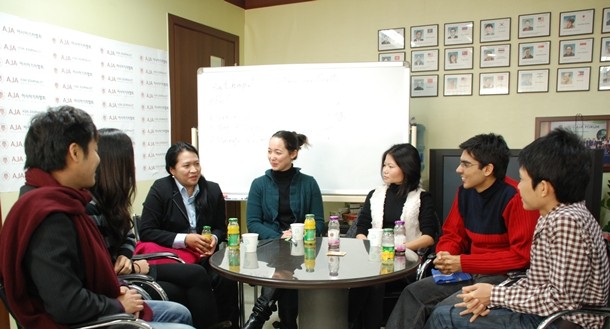Images of Koreans in Foreigners’ Eyes
The number of registered foreigners living in Korea is around 920,000 according to the data of the Statistics Korea. They are living in Korea with Koreans and Korean culture and what do they think of Korea as a whole?
AsiaN hosted “Tea with the foreigners living in Korea” at the Seoul office and heard their stories about “Life in Korea”. Lisa Witter of the KISSA (Korea International Students Support Association) moderated the discussion and 6 nationalities including Nepal, India, Japan, China, Thailand and the Philippines joined the talk. They have stayed in Korea as short as 4 months to as long as 12 years.
Koreans seem to work too hard but at the same time, too shy in front of a foreigner. Vegetarians are hard to find in Korea but Korean food is nutritionally balanced. Means of transport are convenient but the system is complex. Koreans are too loud in public places and sometimes sound as if quarreling. Here is their vivid account.
Koreans study “too” hard and work “too” hard
Rahul Anand from India and Rattapol Piriyathanaruk from Thailand are roommates studying MBA course at KAIST (Korea Advanced Institute of Science and Technology). They said, “Koreans work too hard. Korean students study really hard”. They added that maybe it is KAIST culture but in general, it is a fact that Koreans make something against all odds.
Rahul especially said, “Koreans are very nice and kind people. But what has surprised me is they sit up 2 or 3 in the morning. It should be common to have a break at home after work but that is not the case in Korea. Long working hours is actually culture shock. General atmosphere of studying late and working late is strange to me.” Rattapol continued, “Koreans just focus on work and it seems to be difficult to have outside interests.”
On the contrary, Vera Yang from China said that the only inconvenience of living in Korea is “the Korean language” since more than 500,000 Chinese are staying in Korea. “In my university alone, about 700 Chinese students are found and there are quite many Koreans who can speak Chinese as well.”
Donnabelle Casipong from the Philippines is an immigrant wife and she talked about an episode when she first came to Korea. “One day, I got on a bus in Cheongnyangni and soon realised the bus was going the complete opposite. I asked the police to help me talk to my husband on the phone but he didn’t understand and just closed the mobile phone. But nowadays, things are a lot better. Information centres have been built for tourists everywhere.”
She also added, “It was even shocking to see the Koreans fighting for a seat in public places and women speak in really loud voices.’ Saraswati Rai from Nepal said, “When I first went to a Korean eatery, I thought a few Korean men at the next table were quarrelling. In fact, they were just talking very loudly.”
The panel thinks Korea is more advanced than other Asian countries but the Koreans usually do not associate with foreigners.
Saraswati said, “In Nepal, even children say something when they see a foreigner in the street. But Koreans are very shy and they are afraid of speaking English.”
Vegetarians are hard to find but Korean food is nutritionally balanced
All the panellists think Korea still does not have the concept of “vegetarianism”.
Rattapol said, “I came from Thailand where a lot of tropical fruits are grown and I think Korea lacks a wide variety of fruit.” Saraswati agreed with him. Morinaga Takehiro from Japan added, “It is inconvenient when I can’t find various foreign restaurants.”
On the other hand, some panellists worship Korean food. Donnabelle said, “At first, Korean food was too spicy. I suffered from a tummy upset and I was on the verge of tears. But now, I even enjoy bean-paste pot stew. I think Korean food is nutritionally well balanced. I’d like to take Kimchi, seaweed paper, bean-paste, hot-pepper paste and the like to the Philippines.”
Saraswati continued, “The Nepalis eat less meat and more vegetables than the Koreans but the Nepali people tend to overcook food. So, Korean food is probably better nutritionally.”
Korea with convenient technologies and public services
Rattapol said, “Korean transport is really advanced. Metro stations are everywhere. I’d like to take that to Thailand.” Rahul said, “Integration of technology in Korea such as transport card and universal ATM card is beautiful. India does not have this.” Takehiro added, “I think I travel a lot in Korea rather than my Osaka days because of convenient transport.”
However Vera had a different opinion. “I don’t think Korean transport is convenient. Shanghai metro is far easier than that of Korea. In Shanghai, you just walk straight to transfer lines but in Korea, you have to walk a lot and turn a lot. Probably the design is different.”
Meanwhile, the panellists praised public services of Korea for its speed. Saraswati complained that in Nepal, it takes several days to have a piece of document while Donnabelle criticized the system of the Philippines saying, “It could take several months to get a piece of document.”
Choi Sun-hwa sun@theasian.asia




























































One Response to Images of Koreans in Foreigners’ Eyes